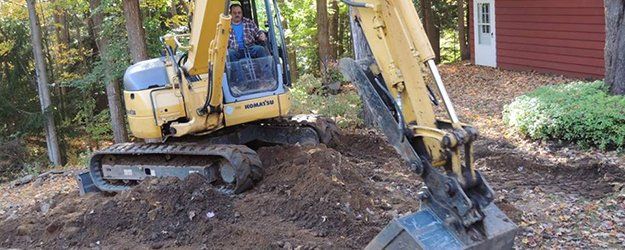Affordable Lancaster Excavation - Quality Excavation at Competitive Costs
Affordable Lancaster Excavation - Quality Excavation at Competitive Costs
Blog Article
Comprehensive Excavation Techniques: Understanding the Basics for Success
In the world of building and civil design, the significance of efficient excavation approaches can not be overstated. The cautious preparation, specific execution, and precise focus to information required in excavation tasks demand a thorough approach that includes numerous basic aspects. From first soil analysis to the execution of precaution and routine progression monitoring, mastering these core aspects is essential for achieving success in any type of excavation venture. Nonetheless, the true mastery lies not merely in recognizing these fundamentals however in seamlessly incorporating them to browse the intricacies of excavation tasks with finesse.
Recognizing Excavation Task Preparation

The preliminary phase of any type of excavation project is the preparation stage, where essential choices are made that can considerably affect the end result of the task. Understanding the project range, timeline, and budget plan restraints is important for creating a thorough excavation plan that makes certain the job's success.
One trick element of excavation task preparation is the development of an in-depth timeline that outlines the sequence of turning points, activities, and due dates. By thoroughly thinking about all these aspects throughout the preparation stage, excavation jobs can be performed successfully and efficiently, leading to effective end results - lancaster excavation.
Dirt Evaluation and Site Assessment
Carrying out thorough soil analysis and website evaluation is an essential step in the preparation stage of any kind of excavation job. Dirt evaluation involves establishing the make-up, framework, and residential properties of the soil at the excavation site. This information is crucial for recognizing the dirt's bearing capability, dampness content, and possibility for erosion, which are key consider establishing the excavation approaches and tools needed for the task.
Site evaluation exceeds dirt evaluation and includes a wider assessment of the total website conditions. This evaluation includes identifying any prospective threats, such as underground energies, ecological problems, or unpredictable surface, that might affect the excavation process. By thoroughly evaluating the site, task supervisors can create reliable excavation techniques that focus on safety and security, performance, and ecological protection.
Utilizing advanced technologies like ground-penetrating radar, dirt tasting, and drone surveys can enhance the precision and effectiveness of soil analysis and website assessment. Investing time and sources in these preliminary steps can inevitably conserve time and avoid costly hold-ups or difficulties throughout the excavation process.
Tools Option and Utilization
Reliable excavation jobs rely greatly on tactical equipment option and usage to ensure optimum performance and performance. Choosing the right devices for the job is essential in optimizing effectiveness and decreasing downtime. Aspects such as the type of dirt, depth of excavation, and job scope play a substantial role in establishing the most ideal equipment for the job at hand.

Along with picking the ideal tools, correct utilization is key to project success. Operators must be trained to handle the equipment safely and successfully - lancaster trenching. Routine maintenance checks and timely repairs help prevent breakdowns and ensure regular efficiency throughout the job
Security Steps and Regulations Conformity
In the world of excavation jobs, prioritizing precaution and conformity with guidelines is critical to ensuring a legally sound and protected operational setting. Precaution incorporate a variety of practices, consisting of carrying out extensive site assessments, applying appropriate signs and obstacles, and over here providing ample security training for all personnel entailed in the excavation process. Adherence to laws, such as OSHA demands in the USA, makes sure that the excavation project satisfies the necessary requirements to protect employees, bystanders, and the surrounding setting.

Tracking Progress and Adjusting Strategies
How can forecast managers successfully track the advancement of excavation jobs and adjust their techniques accordingly to maximize results? Surveillance development is important for ensuring that excavation tasks remain on track and meet due dates.

Final Thought
In conclusion, understanding the basics of extensive excavation approaches is crucial for the success of any type of project. By recognizing job planning, examining soil and website conditions, selecting ideal devices, following security regulations, and checking development, task supervisors can ensure a reliable and smooth excavation process. Applying these techniques will certainly lead to effective end results and reduce possible risks or troubles during the excavation job.
The first phase of any type of excavation task is the planning phase, where critical choices are made that can dramatically influence the end result of the task. Comprehending the job range, spending plan, and timeline constraints is vital for creating an extensive excavation strategy that makes certain the task's success.
How can read review project managers successfully track the development of excavation projects and adjust their techniques accordingly to optimize outcomes? By closely checking development and being willing to adjust approaches, task supervisors can improve the overall success of excavation jobs.
By comprehending job planning, assessing dirt and website conditions, picking ideal tools, abiding with safety guidelines, and keeping track of progression, job managers can ensure a smooth and reliable excavation procedure.
Report this page